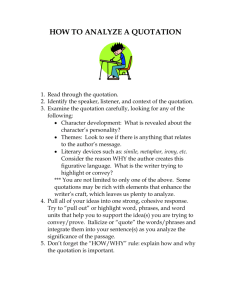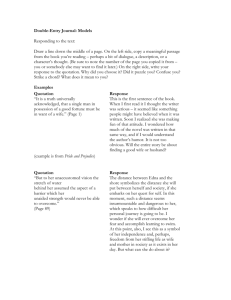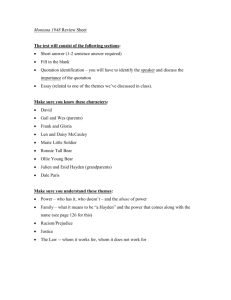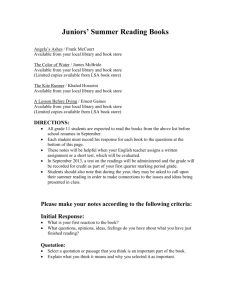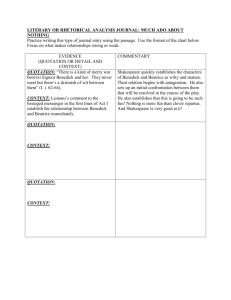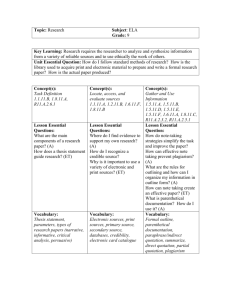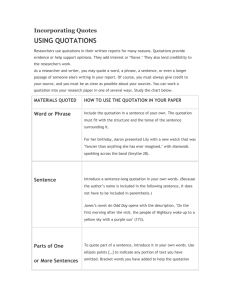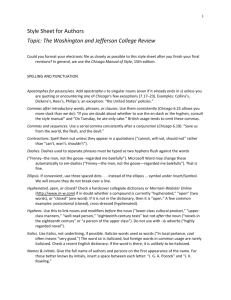Word file
advertisement
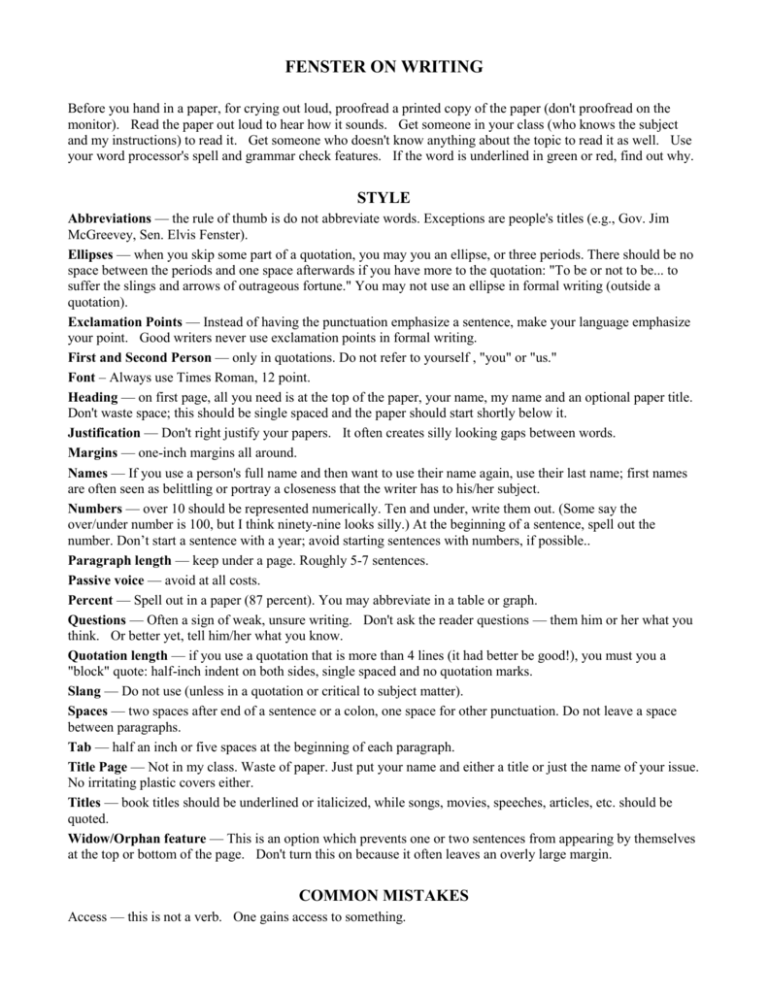
FENSTER ON WRITING Before you hand in a paper, for crying out loud, proofread a printed copy of the paper (don't proofread on the monitor). Read the paper out loud to hear how it sounds. Get someone in your class (who knows the subject and my instructions) to read it. Get someone who doesn't know anything about the topic to read it as well. Use your word processor's spell and grammar check features. If the word is underlined in green or red, find out why. STYLE Abbreviations — the rule of thumb is do not abbreviate words. Exceptions are people's titles (e.g., Gov. Jim McGreevey, Sen. Elvis Fenster). Ellipses — when you skip some part of a quotation, you may you an ellipse, or three periods. There should be no space between the periods and one space afterwards if you have more to the quotation: "To be or not to be... to suffer the slings and arrows of outrageous fortune." You may not use an ellipse in formal writing (outside a quotation). Exclamation Points — Instead of having the punctuation emphasize a sentence, make your language emphasize your point. Good writers never use exclamation points in formal writing. First and Second Person — only in quotations. Do not refer to yourself , "you" or "us." Font – Always use Times Roman, 12 point. Heading — on first page, all you need is at the top of the paper, your name, my name and an optional paper title. Don't waste space; this should be single spaced and the paper should start shortly below it. Justification — Don't right justify your papers. It often creates silly looking gaps between words. Margins — one-inch margins all around. Names — If you use a person's full name and then want to use their name again, use their last name; first names are often seen as belittling or portray a closeness that the writer has to his/her subject. Numbers — over 10 should be represented numerically. Ten and under, write them out. (Some say the over/under number is 100, but I think ninety-nine looks silly.) At the beginning of a sentence, spell out the number. Don’t start a sentence with a year; avoid starting sentences with numbers, if possible.. Paragraph length — keep under a page. Roughly 5-7 sentences. Passive voice — avoid at all costs. Percent — Spell out in a paper (87 percent). You may abbreviate in a table or graph. Questions — Often a sign of weak, unsure writing. Don't ask the reader questions — them him or her what you think. Or better yet, tell him/her what you know. Quotation length — if you use a quotation that is more than 4 lines (it had better be good!), you must you a "block" quote: half-inch indent on both sides, single spaced and no quotation marks. Slang — Do not use (unless in a quotation or critical to subject matter). Spaces — two spaces after end of a sentence or a colon, one space for other punctuation. Do not leave a space between paragraphs. Tab — half an inch or five spaces at the beginning of each paragraph. Title Page — Not in my class. Waste of paper. Just put your name and either a title or just the name of your issue. No irritating plastic covers either. Titles — book titles should be underlined or italicized, while songs, movies, speeches, articles, etc. should be quoted. Widow/Orphan feature — This is an option which prevents one or two sentences from appearing by themselves at the top or bottom of the page. Don't turn this on because it often leaves an overly large margin. COMMON MISTAKES Access — this is not a verb. One gains access to something. All right — always two words. "Alright" is pure slang. A lot — two words. "Alot" is not and never has been a word, just as "alittle" is not a word. Already — different from "all ready." Also, — an awful way to start a sentence. Move the also to just before the verb (but don't split your infinitive!). Amongst — That's pretentious. Try "among." Cannot — one word, not two. Cliches – you know what these are, but in particular, avoid: "Nowadays", "in this day and age" Contractions — only may be used in quotations. Dept — Why do so many students think this is the proper way to spell "debt"? Due to the fact that — one of the most irritating, overused clauses. Economic vs. Economical — A car that gets good mileage is economical. The monetary policies of the government are economic. Etc. — This means "and the rest," essentially an abbreviation. This is lazy writing and does not belong in a formal paper (unless in a quotation). Ensure/Insure — these mean different things. The latter refers to insurance. Impact — should not be used as a stand-alone verb; one has an impact, one doesn't impact. One's teeth are impacted. Incidents/Instances — There is no such thing as "incidences." Quotation verbs — Said, argued, wrote, etc. If something was said aloud, then you can say "stated" or "said," but it the words were those of a writer, then "wrote" is more appropriate. Don't ever have a quotation without properly introducing it (sentences should not start with quotation marks). Redundance — Saying something twice doesn't make it stronger, it just makes you look bad (e.g., "regress back," "come together/unite as one"). So, — yet another awful way to begin a sentence. Completely unacceptable. Thesaurus — You should definitely use one, but don't go overboard with it. This — This word should never be used without a noun immediately following it, i.e., "this word." Try and — You don't "try and do" something, you try TO do it. U.S. and U.N. — these abbreviations may only be used as adjectives. Spell them out for use as nouns. Whether or not — In many circumstance the "or not" is unnecessary. Try reading the sentence without it — does it work? EDITING NOTATION 3 underlines = capitalize slash through a letter = lower case awk = awkward wc = poor word choice NAS! = not a sentence frag = fragment (of a sentence) ^ = insert squiggle wrapping around two letters or words = transpose circle = something's wrong here I'm not the greatest writer in the world, but I know what I'm talking about. Heed this advice and you're on your way to — at least — competence. http://bobfenster.com/general2.html November 25, 2007

